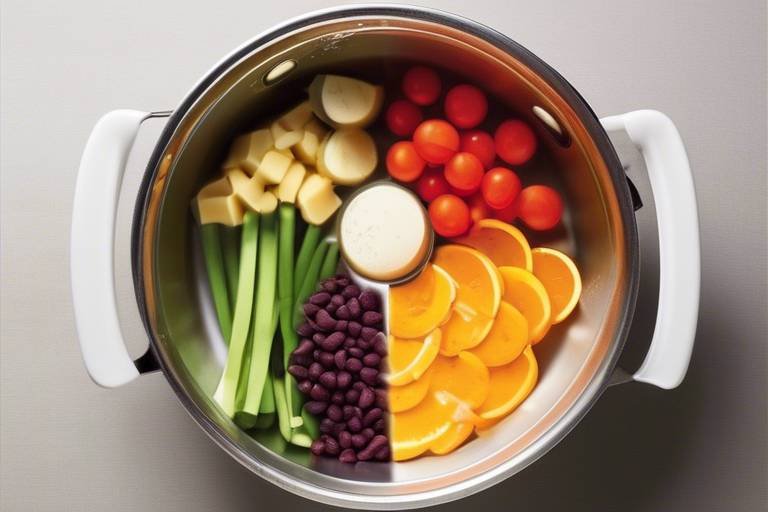10 Hacks for a More Sustainable Lifestyle
Living a more sustainable lifestyle doesn't have to be complicated or overwhelming. In fact, with a few simple hacks, you can make a significant impact on the environment while also improving your own well-being. By incorporating these sustainable practices into your daily routine, you can reduce your carbon footprint and contribute to a greener planet.
One of the easiest ways to reduce waste and environmental impact is by reducing single-use plastics. Instead of relying on disposable items like plastic bags, water bottles, and containers, opt for reusable alternatives. By making this simple switch, you can minimize the amount of plastic waste that ends up in landfills and oceans, helping to protect our planet's ecosystems.
Embracing Meatless Mondays is another effective way to promote sustainability in your diet. By incorporating more plant-based meals into your weekly menu, you can reduce the demand for resource-intensive animal products, lower greenhouse gas emissions, and support sustainable agriculture practices. Plus, you might discover some delicious new recipes along the way!
When it comes to transportation, choosing eco-friendly options can have a big impact on air quality and carbon emissions. Whether it's walking, biking, carpooling, or taking public transportation, opting for alternatives to driving alone in a car can help reduce your environmental footprint and promote cleaner air in your community.
Conserving energy at home is not only good for the environment but can also save you money on utility bills. Simple habits like using energy-efficient LED bulbs, unplugging electronics when not in use, and adjusting your thermostat can lower your energy consumption and reduce your overall environmental impact.
Shopping secondhand and upcycling old items are great ways to support a circular economy and reduce waste. Thrift shopping can lead to unique finds, while upcycling allows you to breathe new life into old items that might otherwise end up in a landfill. By embracing these practices, you can contribute to a more sustainable and eco-conscious lifestyle.
Gardening, whether you have a backyard or just a windowsill, can be a rewarding way to grow your own food and connect with nature. By cultivating your own fruits, vegetables, or herbs, you can reduce your reliance on store-bought produce, lower your food miles, and enjoy the satisfaction of harvesting your own fresh ingredients.
Water is a precious resource that should be conserved whenever possible. Simple actions like fixing leaks, taking shorter showers, and investing in water-efficient appliances can help reduce water waste in your home. By being mindful of your water usage, you can play a part in preserving this essential resource for future generations.
Supporting sustainable brands that prioritize ethical and eco-conscious practices is a powerful way to make a positive impact through your purchasing choices. By opting for products from companies that align with your values and sustainability goals, you can vote with your wallet and encourage more businesses to adopt environmentally friendly practices.

Reduce Single-Use Plastics
Learn simple yet effective ways to make your daily life more eco-friendly and sustainable, reducing your carbon footprint and contributing to a greener planet.
Single-use plastics have a significant impact on our environment, clogging up landfills and polluting our oceans. By making small changes in our daily routines, we can reduce the amount of plastic waste we produce. Consider swapping out disposable items like plastic bags, water bottles, and food containers for reusable alternatives. Investing in a durable water bottle and bringing your own shopping bags can make a big difference in minimizing plastic consumption. Additionally, opting for products with minimal or recyclable packaging can further reduce your plastic footprint.
When grocery shopping, choose products with minimal packaging or in bulk to avoid unnecessary plastic wrapping. By being mindful of your plastic usage, you can help protect wildlife, preserve natural resources, and create a cleaner environment for future generations.
Remember, every small change adds up to make a big impact. Embracing reusable solutions and reducing single-use plastics in your daily life can lead to a more sustainable and eco-conscious lifestyle.
Exploring plant-based meal options not only benefits your health but also has a positive impact on the environment. By reducing meat consumption, you can lower your carbon footprint and support sustainable agriculture practices. Incorporating more fruits, vegetables, legumes, and grains into your diet can help decrease greenhouse gas emissions associated with livestock production. Meatless Mondays are a great way to start the week on a healthy and eco-friendly note, while also discovering delicious plant-based recipes.
Choosing plant-based alternatives can introduce variety to your meals, boost your nutrient intake, and contribute to a more sustainable food system. By making conscious choices about what you eat, you can play a part in reducing the environmental strain caused by industrial meat production.
Join the movement towards a greener plate and explore the benefits of incorporating more plant-based foods into your diet. Your body and the planet will thank you for it!
Reducing emissions from transportation is crucial in combating climate change and improving air quality. By choosing eco-friendly modes of transportation like walking, biking, carpooling, or using public transit, you can reduce your carbon footprint and promote a cleaner environment. Walking or biking for short distances not only benefits the environment but also contributes to your physical well-being.
Consider carpooling with coworkers or using public transportation for your daily commute to reduce the number of vehicles on the road. By sharing rides or opting for public transit, you can help decrease traffic congestion and emissions, making a positive impact on air quality. Making conscious choices about how you travel can lead to a more sustainable and healthier lifestyle.
Energy conservation is key to reducing greenhouse gas emissions and lowering utility costs. Simple changes in your home routine, such as switching to energy-efficient LED bulbs, unplugging electronics when not in use, and adjusting your thermostat, can make a significant difference in energy consumption. By being mindful of your energy usage, you can contribute to a more sustainable future and save money on your utility bills.
Consider installing a programmable thermostat to regulate your home's temperature efficiently or using natural light during the day to reduce the need for artificial lighting. Small actions like these can add up to significant energy savings over time, benefiting both the environment and your wallet.
Thrift shopping and upcycling are not only fun activities but also sustainable practices that reduce waste and support a circular economy. By exploring secondhand stores or online platforms, you can find unique treasures while giving new life to pre-loved items. Upcycling old clothes, furniture, or accessories allows you to express your creativity and contribute to a more sustainable lifestyle.
Supporting secondhand markets and local artisans promotes sustainable consumption and reduces the demand for new products, which often come with a high environmental cost. By embracing the concept of "reduce, reuse, recycle," you can play a part in minimizing waste and promoting a more circular economy that values resourcefulness and creativity.
Gardening is a rewarding activity that not only provides fresh produce but also connects you with nature and promotes self-sufficiency. Whether you have a backyard, balcony, or windowsill, growing your own herbs, fruits, and vegetables can reduce your reliance on store-bought produce and minimize food miles. By cultivating a small garden, you can enjoy the flavors of homegrown food while reducing your carbon footprint.
Consider starting with easy-to-grow plants like herbs or salad greens if you are new to gardening. Engaging with the process of planting, nurturing, and harvesting your own food can instill a sense of pride and accomplishment, while also fostering a deeper connection to the natural world. Embrace the joy of growing your own food and reap the benefits of a sustainable and fulfilling hobby.
Water is a precious resource that we must conserve to ensure a sustainable future. Simple actions like fixing leaks, taking shorter showers, and using water-efficient appliances can help reduce water waste in your daily life. By being mindful of your water usage, you can contribute to water conservation efforts and protect this essential resource for future generations.
Consider installing low-flow showerheads and faucets to minimize water usage without compromising on functionality. Collecting rainwater for outdoor plants or using a water-saving dishwasher can also contribute to overall water savings in your household. By making conscious choices about water consumption, you can play a part in preserving this vital resource and promoting sustainability.
Choosing products from ethical and eco-conscious brands is a powerful way to align your values with your purchasing decisions. By supporting companies that prioritize sustainability in their products and practices, you can contribute to a more environmentally friendly marketplace. Look for certifications like Fair Trade, organic, or cruelty-free when shopping to ensure that your purchases reflect your commitment to sustainability.
Researching brands that prioritize transparency, ethical sourcing, and eco-friendly production methods can help you make informed choices about the products you buy. By supporting sustainable brands, you can advocate for positive change in the industry and encourage others to make conscious consumer decisions. Every purchase you make is an opportunity to support a more sustainable and ethical future.

Embrace Meatless Mondays
Embracing Meatless Mondays is a fantastic way to make a positive impact on both your health and the environment. By dedicating one day a week to plant-based meals, you can significantly reduce your carbon footprint and support sustainable agriculture. Imagine your plate as a canvas, ready to be filled with vibrant and nutritious fruits, vegetables, legumes, and grains. This simple change not only benefits the planet but also introduces you to a world of delicious and creative culinary possibilities.
Transitioning to a plant-based diet, even just one day a week, can lead to numerous health benefits, such as improved heart health, weight management, and increased energy levels. By choosing plant-based proteins like beans, lentils, and tofu over meat, you are not only reducing your impact on the environment but also nourishing your body with essential nutrients and fiber.
On Meatless Mondays, you can explore a variety of cuisines and recipes that celebrate the beauty and diversity of plant-based ingredients. From hearty lentil soups to colorful buddha bowls and flavorful veggie stir-fries, there is no shortage of delicious options to satisfy your taste buds and inspire your culinary creativity.
Moreover, by participating in Meatless Mondays, you are joining a global movement that is making a real difference in the fight against climate change. The livestock industry is a significant contributor to greenhouse gas emissions, deforestation, and water pollution. By reducing your meat consumption and choosing plant-based alternatives, you are taking a proactive step towards a more sustainable future for our planet.
So, why not start your week on a fresh and eco-friendly note by embracing Meatless Mondays? Challenge yourself to try new recipes, explore different ingredients, and discover the joy of cooking and eating plant-based meals. Every small change in your diet can have a ripple effect on the environment, creating a more sustainable and vibrant world for future generations to enjoy.

Opt for Eco-Friendly Transportation
When it comes to reducing your carbon footprint and contributing to a healthier planet, your choice of transportation plays a significant role. Opting for eco-friendly transportation methods can have a positive impact on the environment and your overall well-being. By choosing sustainable ways to travel, you can actively participate in the fight against climate change and air pollution.
Walking or biking for short distances not only helps to reduce emissions but also promotes physical activity and a sense of community. Imagine the fresh air filling your lungs as you pedal your way through the neighborhood, feeling the sun on your face and the wind in your hair. It's not just a mode of transport; it's an experience that connects you with your surroundings in a unique way.
Additionally, carpooling or using public transportation are excellent alternatives to driving solo. Sharing rides with others not only decreases the number of vehicles on the road but also fosters social interactions and reduces traffic congestion. Picture yourself chatting with fellow commuters on a bus ride, sharing stories and laughter while collectively lowering your carbon emissions. It's like a mini-adventure every time you step onboard.
Moreover, if you need to drive, consider car-sharing services or electric vehicles to minimize your environmental impact. Electric cars are becoming increasingly popular for their sustainability benefits, emitting fewer greenhouse gases and reducing reliance on fossil fuels. Imagine cruising down the street in a sleek electric car, knowing that you're contributing to a cleaner and greener future for generations to come.
By making conscious choices in your daily transportation habits, you can make a tangible difference in the fight against climate change. Whether it's choosing to walk, bike, carpool, or drive an electric vehicle, each decision counts towards building a more sustainable future for our planet. So, why not embark on this eco-friendly journey today and pave the way for a cleaner, healthier world for all?

Conserve Energy at Home
When it comes to creating a more sustainable lifestyle, conserving energy at home is a crucial step that not only benefits the environment but also helps you save on utility bills. One effective way to reduce energy consumption is by upgrading to LED bulbs. These energy-efficient bulbs use significantly less electricity compared to traditional incandescent bulbs, lasting longer and reducing the need for frequent replacements.
Another simple yet impactful tip is to unplug electronics when they are not in use. Many devices continue to draw power even when turned off, contributing to what is known as "vampire energy" consumption. By unplugging devices or using power strips, you can easily cut down on this unnecessary energy waste.
Adjusting your thermostat is another effective way to conserve energy at home. During the colder months, lowering your thermostat by just a few degrees can lead to significant energy savings. Similarly, in the summer, raising the thermostat slightly can reduce the workload on your air conditioning system, helping you save energy and money.
Investing in energy-efficient appliances is a long-term solution to reducing energy consumption in your home. Look for appliances with the ENERGY STAR label, which indicates that they meet strict energy efficiency guidelines set by the Environmental Protection Agency. These appliances not only consume less energy but also perform efficiently, contributing to a greener household.
Creating a home energy audit can also help you identify areas where energy is being wasted and make necessary improvements. From sealing drafts around doors and windows to improving insulation, an energy audit provides valuable insights into how you can make your home more energy-efficient and environmentally friendly.

Shop Secondhand and Upcycle
When it comes to making sustainable choices in your daily life, one of the most rewarding practices is shopping secondhand and upcycling. Not only does this help reduce waste and promote sustainability, but it also allows you to discover unique treasures with a story to tell. Thrift shopping has gained popularity not only for its environmental benefits but also for the thrill of finding hidden gems at affordable prices.
By opting for secondhand items, you contribute to a circular economy where products are reused and repurposed, extending their lifespan and diverting them from landfills. Upcycling takes this concept a step further by transforming old or discarded items into new, functional pieces through creativity and craftsmanship. It's a way to breathe new life into objects that might have otherwise been discarded.
Embracing secondhand shopping and upcycling also allows you to express your individual style and stand out from the crowd with pieces that are truly one-of-a-kind. Whether it's vintage clothing, retro furniture, or quirky accessories, each item tells a story and adds character to your personal space.
Moreover, shopping secondhand and upcycling align with sustainable fashion practices, reducing the demand for new resources and minimizing the environmental impact of the fashion industry. By supporting thrift stores, local artisans, and upcycling initiatives, you contribute to a more conscious and ethical way of consuming goods.
Next time you're looking to refresh your wardrobe, decorate your home, or find a unique gift, consider exploring secondhand stores, online marketplaces, or local flea markets. You never know what hidden treasures you might uncover and the positive impact you can make by choosing pre-loved items and embracing the art of upcycling.

Grow Your Own Food
Learn simple yet effective ways to make your daily life more eco-friendly and sustainable, reducing your carbon footprint and contributing to a greener planet.
When you grow your own food, you not only have access to fresh and organic produce but also reduce the environmental impact of food transportation. Imagine stepping out into your backyard or tending to a small garden on your windowsill, nurturing plants that will soon provide you with delicious vegetables and herbs. It's a rewarding experience that not only connects you with nature but also allows you to control what goes into your food.
By growing your own food, you can reduce the carbon footprint associated with commercial agriculture and food distribution. You eliminate the need for long transportation distances and excessive packaging that often come with store-bought produce. Additionally, you can avoid harmful pesticides and chemicals, ensuring that your food is healthy and safe for consumption.
Whether you have a spacious garden or just a few pots on a balcony, growing your own food promotes sustainability by encouraging self-sufficiency and reducing reliance on large-scale agricultural practices. It's a small yet impactful step towards a more sustainable lifestyle that benefits both you and the environment.
If you're new to gardening, start with easy-to-grow plants like herbs, cherry tomatoes, or lettuce. Experiment with different varieties and techniques, and soon you'll be enjoying the fruits of your labor while contributing to a greener world.

Reduce Water Waste
Learn simple yet effective ways to make your daily life more eco-friendly and sustainable, reducing your carbon footprint and contributing to a greener planet.
Water is a precious resource that we often take for granted. By making small changes in our daily routines, we can significantly reduce water waste and help conserve this vital element for future generations. One of the easiest ways to do this is by fixing leaks promptly. A dripping faucet may seem insignificant, but over time, it can waste a significant amount of water. Additionally, taking shorter showers can make a big difference. By cutting down your shower time by just a few minutes, you can save gallons of water each week. Another effective way to reduce water waste is by using water-efficient appliances. Dishwashers and washing machines with high energy star ratings can help minimize water usage without compromising performance.
Furthermore, incorporating water-saving habits in your daily life, such as turning off the tap while brushing your teeth or collecting rainwater for gardening, can contribute to significant water conservation. By being mindful of our water usage and implementing these simple strategies, we can play a part in preserving this essential resource for a sustainable future.
Q: How can I check for water leaks in my home?
A: To check for leaks, monitor your water meter before and after a period when no water is being used. If the meter changes when no water is being used, you likely have a leak.
Q: Are water-efficient appliances expensive?
A: While water-efficient appliances may have a higher upfront cost, they can lead to long-term savings on your water bills. Additionally, many utility companies offer rebates or incentives for purchasing energy-efficient appliances.
Q: How can I collect rainwater for gardening?
A: You can set up a simple rain barrel system to collect rainwater from your roof. This harvested rainwater can then be used to water your plants, reducing the need for tap water.

Support Sustainable Brands
Supporting sustainable brands is not only a choice but a powerful statement towards a greener future. By opting for products from companies that prioritize eco-conscious practices, you are actively contributing to a more sustainable economy. These brands go beyond profit margins and prioritize ethical sourcing, fair labor practices, and environmentally friendly production methods. When you choose to support sustainable brands, you are endorsing a shift towards a more responsible and mindful consumer culture.
One of the key benefits of supporting sustainable brands is the positive impact it has on the environment. These companies often use recycled materials, reduce waste in their production processes, and support initiatives that aim to preserve natural resources. By investing in products from sustainable brands, you are indirectly investing in the health of our planet, ensuring a cleaner and more sustainable future for generations to come.
Moreover, sustainable brands often prioritize transparency and accountability in their operations. They are open about their supply chains, production methods, and the impact of their products on the environment. By choosing to support these brands, you are making an informed choice that aligns with your values and beliefs. You can trust that the products you purchase have been ethically and sustainably produced, giving you peace of mind and satisfaction in your consumer choices.
Supporting sustainable brands also sends a powerful message to the market and other businesses. By demonstrating a demand for eco-friendly and ethical products, you are influencing the industry to move towards more sustainable practices. Your choices as a consumer have the potential to drive positive change on a larger scale, encouraging more companies to adopt environmentally responsible policies and contribute to a more sustainable future for all.
Frequently Asked Questions
- What are some easy ways to reduce single-use plastics in daily life?
Consider using reusable bags, water bottles, and containers instead of disposable ones. This simple switch can significantly reduce plastic waste and help protect the environment.
- How can I incorporate more plant-based meals into my diet?
Start by trying Meatless Mondays or swapping out meat for plant-based alternatives a few times a week. This small change can have a positive impact on both your health and the planet.
- What are some eco-friendly transportation options to consider?
Opt for walking, biking, carpooling, or using public transportation whenever possible to reduce emissions and promote cleaner air. These choices can also help you save money and stay active.
- How can I conserve energy at home?
Implement energy-saving practices like using LED bulbs, unplugging electronics when not in use, and adjusting your thermostat to lower energy consumption. These habits can lower your utility bills and reduce your carbon footprint.
- Why is supporting sustainable brands important?
By choosing ethical and eco-conscious brands that prioritize sustainability, you are contributing to a more environmentally friendly future. Supporting these brands helps drive positive change in the industry and encourages others to follow suit.



















